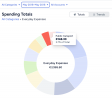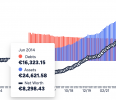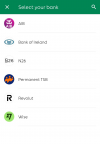Several people on AAM have recommended YNAB (You Need A Budget) over the years, so I thought it would be useful to do a summary post and a thread to discuss pros/cons.
YNAB (www.ynab.com) is a very useful tool for tracking expenses and budgeting. It's browser-based and has iPhone and Android apps. The cost is about €90 per year. There is a 34-day trial and college students can get it free for a year.
It takes a bit of time to set up and get the hang of but they have several good guides and video tutorials. We started using it over 10 years ago when we had a lot of debt and needed to get a handle on things so we could save for a house. It completely changed how we view money and plan our finances.
You start off by adding all of your accounts and balances, e.g. current accounts, credit cards. Most banks will allow you to link to YNAB so that you can automatically import transactions. This is one of the most powerful elements of YNAB - once it's set up you have minimal maintenance, it just populates itself and you can approve the transactions in bulk.
You can add transactions manually, e.g. for cash accounts, and you can track loans. We also track pensions, stocks, other assets (e.g. cars, prize bonds), and even the nominal value of airmiles. Multiple people can use the same account and you can have more than one budget. I have used it in the past to help family/friends who needed to get started. When they were ready to move to their own account, we just exported their budget as a CSV and they switched seamlessly.
Once you have accounts and balances added, you can add transactions (or import them automatically) and tag them with categories, e.g. utilities, healthcare, travel. YNAB remembers the categories so when your Netflix charge is imported from your AIB Visa card each month, YNAB puts it in the entertainment category.
The categories and all transactions are searchable, so it's great for doing expenses and tax returns. You can add notes to each transaction, e.g. a booking code for a flight.
YNAB helps guide you with its 4 rules:
The other rules weren't particularly inspiring but some people like them. There is an online YNAB community that can support you to be as nerdy and detailed about it as you like. We are probably on the more basic end of users.
We really like being able to track our net worth - seeing it grow over the years has been both reassuring and motivating. You can also analyse spending visually, e.g. charts of spending by category.
Here is an example of how you can look at your spending:

You can really drill down and it's amazing/horrifying to look back over a decade and see exactly how much you spent on petrol, parking, pizza...
And here is the Net Worth graph:

The red is liabilities (mortgage, loans) and the blue is assets. The circle is the difference of the two, i.e. net worth. You can zoom in on any month and see the breakdown.
There are lots of different apps that do this, and we tried a few of them, but I really like YNAB. Apart from the app itself, the customer service is very good.
We spend about 1 hour a month between us updating and reviewing, so it's a small time commitment for a big benefit. Once you are set up with auto-import then it really takes care of itself.
YNAB (www.ynab.com) is a very useful tool for tracking expenses and budgeting. It's browser-based and has iPhone and Android apps. The cost is about €90 per year. There is a 34-day trial and college students can get it free for a year.
It takes a bit of time to set up and get the hang of but they have several good guides and video tutorials. We started using it over 10 years ago when we had a lot of debt and needed to get a handle on things so we could save for a house. It completely changed how we view money and plan our finances.
You start off by adding all of your accounts and balances, e.g. current accounts, credit cards. Most banks will allow you to link to YNAB so that you can automatically import transactions. This is one of the most powerful elements of YNAB - once it's set up you have minimal maintenance, it just populates itself and you can approve the transactions in bulk.
You can add transactions manually, e.g. for cash accounts, and you can track loans. We also track pensions, stocks, other assets (e.g. cars, prize bonds), and even the nominal value of airmiles. Multiple people can use the same account and you can have more than one budget. I have used it in the past to help family/friends who needed to get started. When they were ready to move to their own account, we just exported their budget as a CSV and they switched seamlessly.
Once you have accounts and balances added, you can add transactions (or import them automatically) and tag them with categories, e.g. utilities, healthcare, travel. YNAB remembers the categories so when your Netflix charge is imported from your AIB Visa card each month, YNAB puts it in the entertainment category.
The categories and all transactions are searchable, so it's great for doing expenses and tax returns. You can add notes to each transaction, e.g. a booking code for a flight.
YNAB helps guide you with its 4 rules:
- Give Every Dollar a Job - assign all income to a category, including savings targets
- Embrace Your True Expenses - plan for irregular/infrequent but expected expenses, like annual insurance
- Roll With the Punches - re-assign money when you need to, so you can make better choices when money is tight
- Age Your Money - moving away from living paycheck-to-paycheck
The other rules weren't particularly inspiring but some people like them. There is an online YNAB community that can support you to be as nerdy and detailed about it as you like. We are probably on the more basic end of users.
We really like being able to track our net worth - seeing it grow over the years has been both reassuring and motivating. You can also analyse spending visually, e.g. charts of spending by category.
Here is an example of how you can look at your spending:

You can really drill down and it's amazing/horrifying to look back over a decade and see exactly how much you spent on petrol, parking, pizza...
And here is the Net Worth graph:

The red is liabilities (mortgage, loans) and the blue is assets. The circle is the difference of the two, i.e. net worth. You can zoom in on any month and see the breakdown.
There are lots of different apps that do this, and we tried a few of them, but I really like YNAB. Apart from the app itself, the customer service is very good.
We spend about 1 hour a month between us updating and reviewing, so it's a small time commitment for a big benefit. Once you are set up with auto-import then it really takes care of itself.

